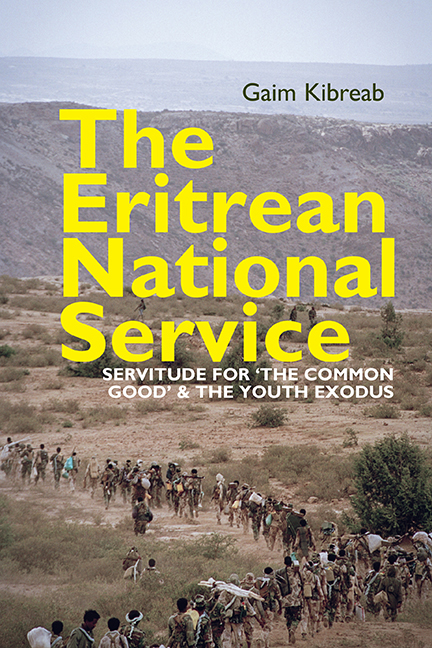Book contents
- Frontmatter
- Dedication
- Contents
- List of Figures and Tables
- Foreword
- Acknowledgements
- List of Acronyms & Abbreviations
- 1 Introduction
- 2 National/Military Service in Africa: Theories and Concepts
- 3 The Government and the Structure of the Eritrean Defence Force
- 4 The Nature of the Eritrean National Service and its Effectiveness as a Fighting Force
- 5 The Eritrean National Service as a Mechanism of Preserving and Transmitting the Core Values of the Liberation Struggle
- 6 The Eritrean National Service: A Vehicle for National Unity and Cohesion
- 7 The Eritrean National Service and Forced Equality
- 8 The Overarching Impact of the Eritrean National Service on the Social Fabric of Eritrean Society
- 9 Impact of the Open-Ended Eritrean National Service on Families and Conscripts
- 10 Conclusion
- Postscript: The UK Upper Tribunal (Immigration and Asylum Chamber) Country Guidance on Eritrea
- References
- Index
- Miscellaneous Endmatter
1 - Introduction
Published online by Cambridge University Press: 11 August 2017
- Frontmatter
- Dedication
- Contents
- List of Figures and Tables
- Foreword
- Acknowledgements
- List of Acronyms & Abbreviations
- 1 Introduction
- 2 National/Military Service in Africa: Theories and Concepts
- 3 The Government and the Structure of the Eritrean Defence Force
- 4 The Nature of the Eritrean National Service and its Effectiveness as a Fighting Force
- 5 The Eritrean National Service as a Mechanism of Preserving and Transmitting the Core Values of the Liberation Struggle
- 6 The Eritrean National Service: A Vehicle for National Unity and Cohesion
- 7 The Eritrean National Service and Forced Equality
- 8 The Overarching Impact of the Eritrean National Service on the Social Fabric of Eritrean Society
- 9 Impact of the Open-Ended Eritrean National Service on Families and Conscripts
- 10 Conclusion
- Postscript: The UK Upper Tribunal (Immigration and Asylum Chamber) Country Guidance on Eritrea
- References
- Index
- Miscellaneous Endmatter
Summary
People are so docile right now. It is almost as if good government means when the politicians lie to us for our own good, for the public good…
James BovardThe Eritrean National Service (ENS) constitutes the nerve centre of postindependence Eritrean polity without which it is difficult to understand and analyse the causes of the successes and failures of the Grand National projects, such as nation building, nurturing of national unity and common Eritrean national identity, post-conflict (re)construction and the building of efficient defence capability. During the liberation struggle, also called the thirty years’ war (1961–1991), the idea of ‘the common good’ in which individual interests were sacrificed in pursuit of the grand cause – independence – was the single most important lynchpin. Its pursuit created a politically and socially acceptable moral justification for the sacrifice of individual interests.
Although the war ended, the ENS continued and has become openended; though intended as a common good, it has degenerated into indefinite forced labour or a modern form of slavery. Consequently, thousands of citizens are forcibly held in endless servitude against their will, under the threat of severe punishment. It affects every aspect of the country's economic, social and political situation, as well as the lives of hundreds of thousands of households and conscripts.
There has not, to date, been any in-depth and critical scrutiny of the ENS's achievements and failures. There is also a dearth of data on its overarching impacts on the social fabric of Eritrean polity. This book is a partial attempt to fill the lacunae. The main aim of this book is to examine the extent to which the stated goals of the ‘national service’, as stipulated in the proclamation on the ENS, various government policy declarations and practices, have been, or are in the process of being, achieved. Unlike other wide-ranging national service programmes discussed briefly in the book, in which the main focus is on citizenship, independence, equality, responsibility and participation, in Eritrea the main emphasis has been on control, loyalty and service. Since 2004, hundreds of thousands of young men and women have fled the country, risking their lives in order to disentangle themselves from an indefinite state of entrapment.
- Type
- Chapter
- Information
- The Eritrean National ServiceServitude for 'the common good' and the Youth Exodus, pp. 1 - 21Publisher: Boydell & BrewerPrint publication year: 2017

